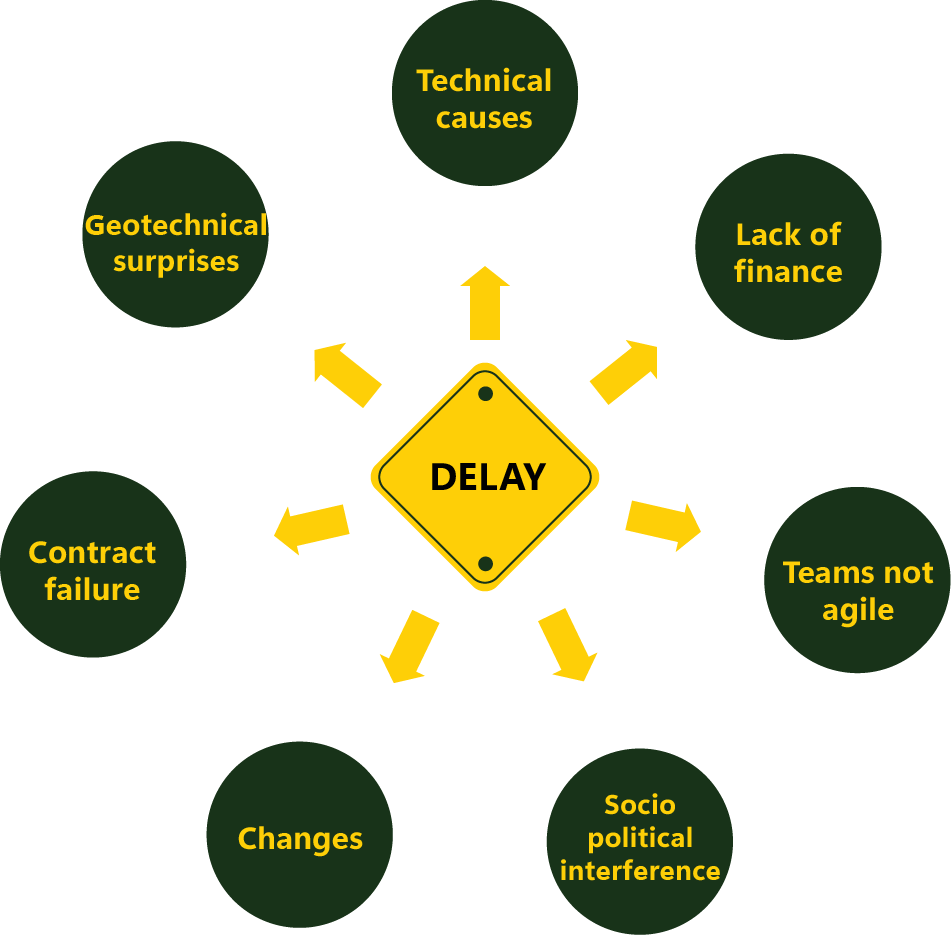GEM Engserv Pvt. Ltd is an ISO 9001:2015 certified organization, certified by TUV India in accreditation with National Accreditation Board for Certification Bodies (NABCB).
GEM Engserv Pvt. Ltd is an ISO 9001:2015 certified organization, certified by TUV India in accreditation with National Accreditation Board for Certification Bodies (NABCB).

The Programme Implementation Wing (MoSPI) keeps track of cost over-runs and delays in projects. From time to time, we get to read that a large number of projects in the infrastructure sector suffer from cost over-run or delays or both. The projects which are tracked are of such large scale that scientific project management practices can be deployed. It is easy to infer that smaller projects, which might not have the ‘luxury’ of proper project management practices may be faring even worse.
It is also a common refrain that the main cause of cost over-run is project delays. Thus, the core problem to be tackled is project delays. There are a number of causes leading to delays in construction project. While the number of specific reasons that can be listed are upwards of 20, the big ticket items are shown in the figure below.

However, the aim of this article is not to analyze the issues causing project delays and to suggest preventive measures. It aims to go back in time and examine the issues when the seed of project delay is actually sown.
If someone, at the later stages of the project, is blamed for project delays, he may be entitled to ask the following questions.
Let us examine each question and see where that leads us.
In my opinion, a large number of projects suffer from vagueness about the intended deadline. There are a few exceptions where, in the office of the CEO, a countdown clock prominently displays number of days to project completion. But these are exceptions than the rule.
Often, the deadline is deliberately kept unspecified so that there is room to wriggle out of ‘failure’! In my opinion, not meeting a widely announced deadline is a smaller crime than not announcing the deadline! Hope more project proponents follow the good practice.
We need to realize that uncertainty about project outcomes (financial, temporal, scope and quality related) are highest at the beginning of the project and gradually diminish with time.
It is also much more difficult to assess the deadline before some technical decisions issues are frozen (scope, type of structure, methodology of construction etc.) There is thus a greater risk of going off the mark if we declare the project deadline too early along the project timeframe.
On the other hand, delay in declaring the timeline may itself be a cause of delay and invite criticism (refer para above)
By its very definition, each project is unique. The uniqueness stems from differences in ownership, location, topography, adoption of technology, and various constraints. It is therefore not possible to arrive at the project deadline with exactitude. What one can achieve is a probabilistic range of schedules – as per optimistic, realistic, and pessimistic scenarios.
It is my experience that more often than not, the project deadline is decided from political considerations with scant regard to the assessment of the range of deadlines. Some leaders genuinely believe that it is better to set tough targets than easy/realistic targets. While there may be merit in this attitude, it should not surprise anyone if the project misses the ambitious deadline. This may explain the attitude of fait accompli that the project team suffers from with regard to the project deadline.
If one were to analyze the large number of projects that are suffering delays, it is likely that one or more of the issues listed above would be found lurking in the background!
So, what are the remedial measures to mitigate these? Given below is a list of possible steps/ measures based on my experience of working on multiple projects of varied natures.
I don’t claim that above-listed measure guarantee 100% success in all types of projects, however, attempts should be made by project proponents to rationally state project timelines to avoid wasting valuable energy in blaming each other for project failures.